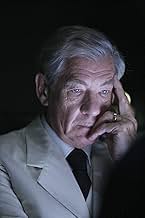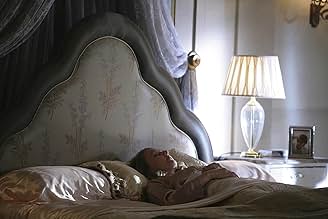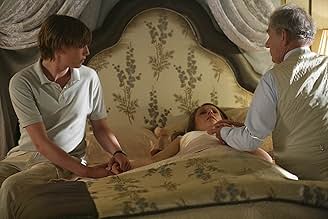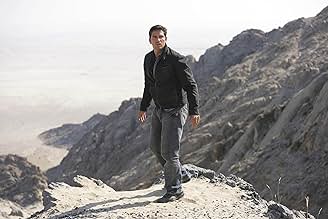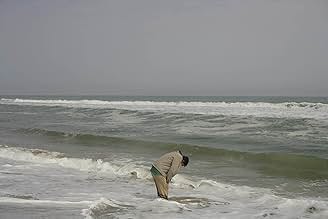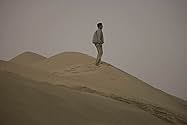The Prisoner
- टीवी मिनी सीरीज़
- 2009
- 45 मि
IMDb रेटिंग
6.1/10
8.1 हज़ार
आपकी रेटिंग
अपनी भाषा में प्लॉट जोड़ेंAn update to the cult favorite series from the 1960s about a government agent who is kidnapped and sent to a remote island known as "The Village."An update to the cult favorite series from the 1960s about a government agent who is kidnapped and sent to a remote island known as "The Village."An update to the cult favorite series from the 1960s about a government agent who is kidnapped and sent to a remote island known as "The Village."
- 2 प्राइमटाइम एमी के लिए नामांकित
- 10 कुल नामांकन
एपिसोड ब्राउज़ करें
फ़ीचर्ड समीक्षाएं
A man resigns from a mysterious agency. Soon, he finds himself in a place known only as "the Village" where nobody has a name but is a number where he's re-dubbed Six by its leader a man known only as Two. Resisting Two's attempts to break his mind with his insistence "I am not a number, I am a free man," Six begins trying to escape while trying to piece together what and where the Village really is. That, in short, is the premise of the six episode miniseries re-imaging of the classic 1967 Patrick McGoohan TV series The Prisoner. The Prisoner is an intriguing psychological thriller with sci-fi overtones.
The miniseries is anchored by a fine cast. Jim Caviezal plays Six, a man lost in a strange world and always on his guard against everyone and everything around him, who is a radically different character from the McGoohan version. His foe is Sir Ian McKellen as Two, the Big Brother like leader who seems benevolent yet is in fact a manipulative and cunning man who brings to mind memories of Leo Mckern in the original series. The villagers include Two's son 11-12 (Jamie Campbell Bower), the beautiful but mysterious doctor 313 (Ruth Wilson) and 4-15 (Hayley Atwell) who has some connection to Six's old life. Together they bring to life the assorted characters who occupy the Village.
By definition, this is a re-imaging of the original series. The biggest change being the focus is on the mind games between Six and Two, making this more of a psychological thriller then the original perhaps was. These include introducing the concept of the Village being the only thing in existence which does stretch creditability quite a bit. More successful are mind games such as in Harmony when Six is told he has brother for example. More successful perhaps is the setting for these mind games is an intriguing new version of the Village set in the middle of the desert. Like in the original, it is here that the sci-fi overtones to come in. With them the series explores issues such as electronic surveillance, mind control and the ability of an individual to resist conforming with society allowing for some intriguing social commentary along the way. Also intriguing is the clever playing with flashbacks to Six's previous life which are not be what they seem. Having said all that, things can be a bit too surreal and downright confusing at times so if you don't have a open mind and don't pick up clues as the miniseries goes on, things can (and will) be baffling. Overall, the re-imaging works splendidly.
There's homages to the original series as well. These include such things as the old man's costume at the beginning of episode one (the role was originally meant as a cameo for the late Patrick McGoohan) and the return of the mysterious balloon like guard Rover. Perhaps the biggest homage lie in the various episode titles which are all derived from original series including Arrival and Checkmate to name just two. This helps to remind the audience that, though this is at times a radical re-imagining of the series, the past hasn't been completely forgotten about.
By blending fine acting, mind games, an intriguing setting, homages to the original series, and clever playing with story-lines and ideas this version of The Prisoner becomes, while not a classic, an intriguing psychological thriller with sci-fi overtones. Are you interested? Then prepare to take a classic TV series in an intriguing new direction. But remember: "You only think you're free."
The miniseries is anchored by a fine cast. Jim Caviezal plays Six, a man lost in a strange world and always on his guard against everyone and everything around him, who is a radically different character from the McGoohan version. His foe is Sir Ian McKellen as Two, the Big Brother like leader who seems benevolent yet is in fact a manipulative and cunning man who brings to mind memories of Leo Mckern in the original series. The villagers include Two's son 11-12 (Jamie Campbell Bower), the beautiful but mysterious doctor 313 (Ruth Wilson) and 4-15 (Hayley Atwell) who has some connection to Six's old life. Together they bring to life the assorted characters who occupy the Village.
By definition, this is a re-imaging of the original series. The biggest change being the focus is on the mind games between Six and Two, making this more of a psychological thriller then the original perhaps was. These include introducing the concept of the Village being the only thing in existence which does stretch creditability quite a bit. More successful are mind games such as in Harmony when Six is told he has brother for example. More successful perhaps is the setting for these mind games is an intriguing new version of the Village set in the middle of the desert. Like in the original, it is here that the sci-fi overtones to come in. With them the series explores issues such as electronic surveillance, mind control and the ability of an individual to resist conforming with society allowing for some intriguing social commentary along the way. Also intriguing is the clever playing with flashbacks to Six's previous life which are not be what they seem. Having said all that, things can be a bit too surreal and downright confusing at times so if you don't have a open mind and don't pick up clues as the miniseries goes on, things can (and will) be baffling. Overall, the re-imaging works splendidly.
There's homages to the original series as well. These include such things as the old man's costume at the beginning of episode one (the role was originally meant as a cameo for the late Patrick McGoohan) and the return of the mysterious balloon like guard Rover. Perhaps the biggest homage lie in the various episode titles which are all derived from original series including Arrival and Checkmate to name just two. This helps to remind the audience that, though this is at times a radical re-imagining of the series, the past hasn't been completely forgotten about.
By blending fine acting, mind games, an intriguing setting, homages to the original series, and clever playing with story-lines and ideas this version of The Prisoner becomes, while not a classic, an intriguing psychological thriller with sci-fi overtones. Are you interested? Then prepare to take a classic TV series in an intriguing new direction. But remember: "You only think you're free."
Too much dialog written in the most obvious fashion. Too little mystery. Too little tension. The essential drama and motivation of the story missing as much as No. 6's mind.
The issues with this series have less to do with its similarity or non-similarity to its source material than it has with the tenor of contemporary film-making and writing. Classicism and all its artistic forms have all but disappeared from education, so it is not surprising that what passes off as entertainment today is hardly groundbreaking or even interesting. There are exceptions to the rule, of course, but by and large episodic television is at a low point.
It isn't even so much that Prisoner 2.0 differs from the original (in itself not necessarily a bad thing if handled properly) but the fact there is little personality to the proceedings is its major weakness.
Film-making, collaborative or auteur, rely on the singular voice of its many artists ringing out in concert, guided by the deliberate hand of a producer or director who sees the forest for the trees. Film-making is about style as much as about content and the two have to cohere meaningfully. When it doesn't, as in this new reboot, the results are muddled.
The presence of Ian McKellen isn't enough to elevate it and Caviezel simply miscast.
Too bad.
The issues with this series have less to do with its similarity or non-similarity to its source material than it has with the tenor of contemporary film-making and writing. Classicism and all its artistic forms have all but disappeared from education, so it is not surprising that what passes off as entertainment today is hardly groundbreaking or even interesting. There are exceptions to the rule, of course, but by and large episodic television is at a low point.
It isn't even so much that Prisoner 2.0 differs from the original (in itself not necessarily a bad thing if handled properly) but the fact there is little personality to the proceedings is its major weakness.
Film-making, collaborative or auteur, rely on the singular voice of its many artists ringing out in concert, guided by the deliberate hand of a producer or director who sees the forest for the trees. Film-making is about style as much as about content and the two have to cohere meaningfully. When it doesn't, as in this new reboot, the results are muddled.
The presence of Ian McKellen isn't enough to elevate it and Caviezel simply miscast.
Too bad.
This is a completely unique interpretation of The Prisoner (1967), so if you are expecting a remake, it will disappoint you. I was an avid viewer of the original. While it shares some imagery and key aspects, beyond that this is a standalone original TV series. Instead (and for some context), imagine what sort of world you live in now, and that someone kidnaps you and you wake up in a mythical village. The question then is why? These changes are not always bad things.
The narrative structure is except for the last episode, also different. The original had concrete narrative blocks, which meant each episode had some clarity. In this series there is no obvious individual narrative block in each episode, the plots run around semi-randomly, only pose questions and don't answer them. The last episode is ironically clearer than the original series, but still leaves the viewer with some sense of confusion. Also, this series only works if you watch it until the end. The dialogue is ok, occasionally very good, but often seems a little too contrived.
Many of the themes from the original series remain such as identity, individuality etc, but perhaps because of the more modern style feel lost or half hearted. There is too much going on, and as a result it lacks depth. This series is from 2009, with a different acting style to the 1960s. Back in those days, stage style acting often appeared on TV, and the original series was no exception to this. Sometimes this worked, other times it was just over the top. Fast forward to this version and the acting is more consistent and suited to the small screen. As ever, Ian McKellen does an excellent job. Jim Caviezel is 90% there. His acting sometimes shines, but it lacks the consistent, excellent performance that you get from McKellen. It feels like he just needs more rehearsal and an injection of some spontaneity now and again. Otherwise his performance and those of the supporting cast is consistent, good but lacks buzz. It feels unfair to compare everyone in The Prisoner to someone such as Ian McKellen, but you just can't help it. In reality, he just lacked a comparable sparring partner in this series.
Image is everything, and the sets and locations are as impressive as the original series. Perhaps more menacing is the sheer similarity of most houses except for the Palace of No. 2. This serves to make the feeling of forced conformity clearer. The design team did an excellent job, with one notable exception, The Clinic; it just feels lame in terms of interior and exterior. There are some occasional references to the original series.
Overall, this series is watchable. Not bad, but just not as good as it could have been. The writing and episode structures are just too confusing and will put many people off. This is a great pity, as its ending is no less clever than the original, only different. Try to get to the end and you will get some reward. This series just tries to hard which is why it doesn't quite make it.
The narrative structure is except for the last episode, also different. The original had concrete narrative blocks, which meant each episode had some clarity. In this series there is no obvious individual narrative block in each episode, the plots run around semi-randomly, only pose questions and don't answer them. The last episode is ironically clearer than the original series, but still leaves the viewer with some sense of confusion. Also, this series only works if you watch it until the end. The dialogue is ok, occasionally very good, but often seems a little too contrived.
Many of the themes from the original series remain such as identity, individuality etc, but perhaps because of the more modern style feel lost or half hearted. There is too much going on, and as a result it lacks depth. This series is from 2009, with a different acting style to the 1960s. Back in those days, stage style acting often appeared on TV, and the original series was no exception to this. Sometimes this worked, other times it was just over the top. Fast forward to this version and the acting is more consistent and suited to the small screen. As ever, Ian McKellen does an excellent job. Jim Caviezel is 90% there. His acting sometimes shines, but it lacks the consistent, excellent performance that you get from McKellen. It feels like he just needs more rehearsal and an injection of some spontaneity now and again. Otherwise his performance and those of the supporting cast is consistent, good but lacks buzz. It feels unfair to compare everyone in The Prisoner to someone such as Ian McKellen, but you just can't help it. In reality, he just lacked a comparable sparring partner in this series.
Image is everything, and the sets and locations are as impressive as the original series. Perhaps more menacing is the sheer similarity of most houses except for the Palace of No. 2. This serves to make the feeling of forced conformity clearer. The design team did an excellent job, with one notable exception, The Clinic; it just feels lame in terms of interior and exterior. There are some occasional references to the original series.
Overall, this series is watchable. Not bad, but just not as good as it could have been. The writing and episode structures are just too confusing and will put many people off. This is a great pity, as its ending is no less clever than the original, only different. Try to get to the end and you will get some reward. This series just tries to hard which is why it doesn't quite make it.
1967's Cold War and its counter culture are gone; they've been replaced by 2009's global village and its consumer culture. So 2009's Prisoner is no longer an angry young man fighting for his identity against secret government policies and flagrant brainwashing, he's an angst-ridden 30-something trying to hang on to his identity in the face of overwhelming marketing and soothing pharmaceuticals.
2009's The Prisoner takes all the familiar elements of 1967's cult classic and re-interprets them in a relevant way, just like good remakes are supposed to. The psychedelic, lava-lamp surrealism of the sixties may be gone, but, don't worry, they've been replaced by the post-modern, dream-like surrealism of the oughts.
Yes, the Village still needs to assimilate No. 6, but it no longer cares why he would wish to resign from its society, it only wants him to understand that he can't. Instead of foiling No. 6's repeated escape attempts from the superficially charming, but inherently oppressive, Village, this new Village, still just as pleasant-looking, and oppressive, just makes it clear that there is no place else to escape to. The consumer culture and its global village are everywhere now. There is no escape.
So, instead of a government desperately trying Pavlovian conditioning, hypnotic suggestion, and hallucinogens in the water, a corporation tries matching people with their perfect mates, giving them mind-numbing jobs to take their minds off their melancholy, distracting them with melodramatic soap operas, and, maybe, making them feel a little better with some gene-therapy.
Sure, everyone's still under surveillance in this Village, but this time, its not the Village government trying to identify revolutionaries so it can silence them, its the Summakor corporation trying to identify dreamers so it can subject them to a concentrated dose of consumer culture. And if that doesn't work, maybe a few pharmaceuticals and a promotion will co-opt the more troublesome ones.
2009's The Prisoner takes all the familiar elements of 1967's cult classic and re-interprets them in a relevant way, just like good remakes are supposed to. The psychedelic, lava-lamp surrealism of the sixties may be gone, but, don't worry, they've been replaced by the post-modern, dream-like surrealism of the oughts.
Yes, the Village still needs to assimilate No. 6, but it no longer cares why he would wish to resign from its society, it only wants him to understand that he can't. Instead of foiling No. 6's repeated escape attempts from the superficially charming, but inherently oppressive, Village, this new Village, still just as pleasant-looking, and oppressive, just makes it clear that there is no place else to escape to. The consumer culture and its global village are everywhere now. There is no escape.
So, instead of a government desperately trying Pavlovian conditioning, hypnotic suggestion, and hallucinogens in the water, a corporation tries matching people with their perfect mates, giving them mind-numbing jobs to take their minds off their melancholy, distracting them with melodramatic soap operas, and, maybe, making them feel a little better with some gene-therapy.
Sure, everyone's still under surveillance in this Village, but this time, its not the Village government trying to identify revolutionaries so it can silence them, its the Summakor corporation trying to identify dreamers so it can subject them to a concentrated dose of consumer culture. And if that doesn't work, maybe a few pharmaceuticals and a promotion will co-opt the more troublesome ones.
Yikes. I don't know what standards The Prisoner is being compared to by other reviewers (other than obviously the original series, which is completely different). While not absolutely stellar, it certainly is superior to almost everything out there on network TV. While it's sometimes difficult to figure out where the four first hours are going, the last two hours are really delivered with the tone of cerebral and philosophical thriller that chillingly ties the mini-series together. I thought the Prisoner's social commentary on the balance between impersonal technology and personal consciousness which is hammered home in the ending sequences was especially effective. The acting level was also certainly above network TV level -- McKellen giving a creepy performance that ultimately becomes understandable as No. 2, and Cazieval, who likes many of his other roles, brings a humanity to character who doesn't quite understand what is going on to him. There are certainly flaws in the production and scripting, but if you come with an open mind and not prepared to judge the series in the context of the original series, I think it's a worthwhile investment of the viewer's time.
क्या आपको पता है
- ट्रिविया"Be seeing you" is a commonly-heard phrase in The Prisoner (1967), this movie, and was also one of Patrick McGoohan's catchphrases in Danger Man (1960) and Danger Man (1964) . McGoohan's character "Johnny Cousin" (a pot-smoking drummer) in All Night Long (1962) uses the phrase also when he says goodbye to the road manager "Berger" towards the end of the movie.
- कनेक्शनFeatured in A Six Hour Film Shot in 92 Days: The Diary of 'The Prisoner' (2010)
टॉप पसंद
रेटिंग देने के लिए साइन-इन करें और वैयक्तिकृत सुझावों के लिए वॉचलिस्ट करें
- How many seasons does The Prisoner have?Alexa द्वारा संचालित
विवरण
- चलने की अवधि45 मिनट
- रंग
- पक्ष अनुपात
- 1.78 : 1
इस पेज में योगदान दें
किसी बदलाव का सुझाव दें या अनुपलब्ध कॉन्टेंट जोड़ें




